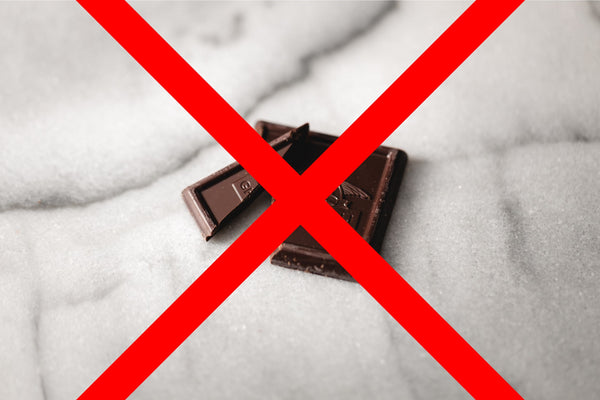A lot of pet owners don’t realize that many household items are poisonous to dogs. Just as you child proof a home when kids are around, it’s also important to do some dog-proofing.
Things that are toxic to dogs and cats may be in your kitchen, your pantry, your garage, and even your yard. This guide is designed to help you make sure that the poisonous items for dogs are kept up and out of reach!
While our list is not comprehensive, we did try to cover the most common items that are poisonous to dogs that many people may have in their homes.
ASPCA Pet Poison Helpline
If you think your dog may have ingested a household item that is poisonous to dogs:
Before we dive into what is toxic to dogs, we want to be sure you have the number for the ASPCA Pet Poison Helpline. If you are not sure if your dog or puppy has eaten something poisonous, please immediately call your veterinarian. If it is after hours, use this number to reach the pet poison helpline:
Household Foods That Can Kill a Dog
This list is by no means exhaustive, but it includes some of the most common household foods that can be poisonous to dogs. Take a look at the following list, review some of the resources included in our article, and always air on the side of caution when feeding your dog foods or letting them be near household products.
1. Raw Dough
Raw bread dough, or yeast dough, contains yeast that is alive and active. Of course, the purpose of yeast in baking is to create carbon dioxide, one of the waste products of yeast, which can continue to be active in your dog’s warm stomach.
If a dog ingests too much raw dough it can create excess gas in the stomach which can not only be painful, but it can sometimes cause the life-threatening emergency known as bloat in dogs.
Yeast is also known to create another waste by-product that is potentially toxic to dogs: Alcohol. If allowed to ferment in the stomach, even small amounts of raw dough could produce a dangerous amount of alcohol which could threaten your dog’s health.
2. Alcohol and Other Drugs
Alcohol and recreational or medicinal drugs are among the more common causes for dog deaths by poisoning each year. Do not assume that a drug is safe for dogs just because it’s safe for humans.
Recreational and pharmaceutical drugs need to be kept out of your dog’s reach. Over-the-counter medications, while perfectly safe for people, can be toxic to dogs due to their different digestive systems. Always consult with your vet before giving your pet over-the-counter medications designed for humans.

3. Coffee, Soda, Caffeine, and Chocolate
Theobromine and caffeine are two compounds found in chocolate that affect the central nervous system and circulatory system in dogs. Dogs are more sensitive than people to these compounds, and even small amounts of chocolate (or other foods high in caffeine) can create stomach problems, high blood sugar levels, liver failure, kidney failure, or death in our canine companions.
A related dangerous product is nicotine, found in high doses in cigarettes and chewing tobacco. E-juices, which often have enticing flavors, are also extremely dangerous when it comes to potentially poisoning your dog. Be sure to keep these products out of the reach of your furry friend.
4. Onions, Garlic, and Leeks
Plants in the Allium genus contain organosulfides, a family of compounds that can be dangerous to our pets, even in small doses. These compounds can cause changes in red blood cells that result in anemia.
Symptoms can appear days after ingestion and include weakness, lethargy, rapid breathing (or panting), high heart rate, pale color of soft mouth tissues, and reddish or brown urine.
5. Grapes, Currants, and Raisins
Not all dogs are reactive to grapes and raisins. However, for a small minority of dogs grapes and raisins can be extremely toxic, even fatal in small doses on some occasions. Researchers don’t really understand why this reaction happens, only that a small number of dogs seem to have it.
Even if you have fed a dog grapes safely in the past, don’t assume they are safe. Since raisins are used in many baked goods, be sure to avoid keeping baked goods in reach of your pooch.
6. Macadamia Nuts
Not fully understood by scientists, macadamia nuts can cause a deadly reaction for some dogs. Please avoid giving your dog macadamia nuts.
Just like people, dogs can develop deadly nut allergies. Many people err on the safe side and avoid giving nuts of any kind (with the exception of peanut butter) to their dogs to avoid the chance of a deadly allergic reaction.
7. Artificial Sweeteners (Especially Xylitol)
Avoid giving your dog any foods with artificial sweeteners. Sugar-free products are particularly dangerous. Pay particular attention to products that contain Xylitol, which has now been shown to be fatally toxic for dogs. It can cause acute hypoglycemia and/or liver failure even in very small doses.
8. Rich, Fatty Foods
While it might be okay to give your pooch a small portion of fatty foods such as chicken skin, please be aware that large amounts (proportionate to the size of your dog) can result in a serious and potentially life-threatening disease known as pancreatitis.
9. Rotten Fruits
Do you have a fruit tree in your yard? While many fruits are safe for our pets, many pet owners don’t realize that when fruit falls from the trees and is allowed to rot, dangerous levels of alcohol can be present.
You may have noticed that some animals, such as deer, will seek out these rotten fruits and may even get “drunk” from them. However, don’t allow your dog to get at overripe fallen fruit because engorging on the alcohol present could cause a fatal overdose.

10. Hops
Are you a home-brewer? While it might be nice to make your own custom beers, please be sure that you keep your hops out of reach of your pets, whether you buy them or grow them. Hops contain vital compounds that can cause serious, even deadly complications when metabolized by dogs.
Poisonous Household Products Toxic to Dogs
Below are some of the items, apart from foods, that could be extremely toxic to your dog. Be sure to keep the items below out of reach from your dog, and take caution if you believe they've been exposed to any of them.
1. Cleaning Products
Common cleaning products such as bleach, detergents, antibacterial cleaners, and more are potentially toxic to your dog.
In fact, many detergents use Borax as the basis for their cleaning power. Sweet in taste, many pets can be tricked into eating this powder with fatal consequences. Despite the fact that it is a natural substance, Borax is nonetheless deadly to dogs. Animal poisoning occurs when pets get under the sink or into closets where owners keep cleaning supplies.
2. Heavy Metals
There are many sources of deadly heavy metals in the average household. Paints, solvents, plumbing materials, golf balls, and linoleum tiles are just some of the common household items that can contain dangerous amounts of heavy metals.
3. Automotive Oils, Liquids, and Other Chemicals
The garage is another great place to be pet-proofing if you are concerned about toxic items that your canine could get into. Many of the liquids (gas, oil, anti-freeze, rat poison, etc) used in car care are potentially toxic to your pooch. The ethylene glycol in anti-freeze, for example, could be fatally toxic.
Keep your garage picked up and store chemicals out of reach to keep Fido safe.
4. Pesticides, Herbicides, and Other Lawn Chemicals
Many of the products used in lawn and garden care include toxins designed to kill pests, weeds, or other living organisms such as fungus. Fertilizers can also be dangerous.
Dog owners should consider all of these products as potentially toxic to their pets and restrict access during and after treatment of specific areas. Keep in mind that your canine can pick up residues on their fur that they will later ingest when they lick their paws. Poisoning from such behavior after a recently treated lawn is, sadly, not uncommon.
Conclusion
There are countless items that should be kept far away from dogs. The odds are that most dogs will encounter one or more of these things in a dangerous way at some point in their lives.
These best thing you can do as a dog owner is be informed, take precautions, keep a close eye on your dog, and visit the veterinarian if you believe your dog has ingested or come into contact with a toxic item.
Things That Are Poisonous to Dogs: FAQs
What are the first steps if I think my dog ingested something toxic?
Contact your veterinarian immediately or the ASPCA Animal Poison Control Center, describe what was eaten, the amount, and when; do not induce vomiting unless a vet instructs you to.
Can a small amount of chocolate harm a dog?
Yes; dogs are sensitive to theobromine and caffeine, and even small amounts of chocolate or other high-caffeine foods can cause serious illness.
Are grapes and raisins always dangerous to dogs?
Not all dogs are reactive, but a small minority can develop severe or even fatal toxicity from grapes, currants, or raisins; avoid them entirely.
How long after eating onions or garlic might symptoms appear?
Signs such as weakness, lethargy, rapid breathing, pale gums, or dark urine can appear days after ingestion.
Is xylitol only found in gum?
No; xylitol and other artificial sweeteners can be in sugar-free foods and products; even very small amounts of xylitol can cause acute hypoglycemia and/or liver failure in dogs.




